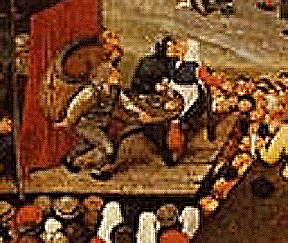Cluijte van Plaijerwater
Cluijte van
Plaijerwater, a farce written by a member of Antwerp's Guild
of St. Lucas, demonstrates another approach toward the
entertainment aspect of these "thoughtful" plays. In
the play, an innkeeper's wife, faking illness, sends her gullible
husband on a quest for plaijerwater ('wonderwater', but with the
connotations of 'wound water' or 'hoax water') which she
instructs him he will find:
At Discontent,
in Eastland, where it flows high up
From the Mountain of Folly near the Valley of Sorrows.
| After the husband departs, the wife's
priest/lover returns. Herr Werenbacht, the hapless
husband is alerted to the deception being carried out on
him by a poultry-peddler. The two of them decide to
return and catch the wife and her lover in the act. The
peddler hides the husband in his basket and sets out to
gain lodging in the inn. The wife and the priest almost
immediately begin to flirt in front of the peddler. |
 |
Unaware of the husband's presence, the priest
sings a song to entertain his mistress,
Oh Werenbracht,
you're such a joy!
Your wife's made you her errand boy!
The road is rough, you're fool enough
To walk a week to find that stuff,
I'm telling you true.
At the height of the merrymaking, Werenbracht
jumps out of the basket and angrily thrashes the lovers. The play
ends with a little speech by Werebracht summarizing the lesson
that he's learned:
Let us honor all
decent women
Who are happy to be with their own husbands,
Now go and may Mary protect you all,
And her son, Jesus of Nazareth,
And may he grant you all peace and happiness.
Conduct your marriage in such a way
That you may enjoy life everlasting.
Typical Rederijker love of wordplay is
evidenced by the fun the script milks from the varying
connotations of the term plaijerwater. Allegory appears in wife's
directions to the mythical substance. However, Cluijte van
Plaijerwater's simple message and is stated fairly explicitly and
not allowed to get in the way of the plot's potential for
crowd-pleasing broad physical comedy. Rederijkers always strove
to write plays that illustrated a message, but the resulting
performances were not always dry and thinly disguised sermons on
morality.

Return to
Plays
Copyright ©
1997 Kelly S. Taylor

